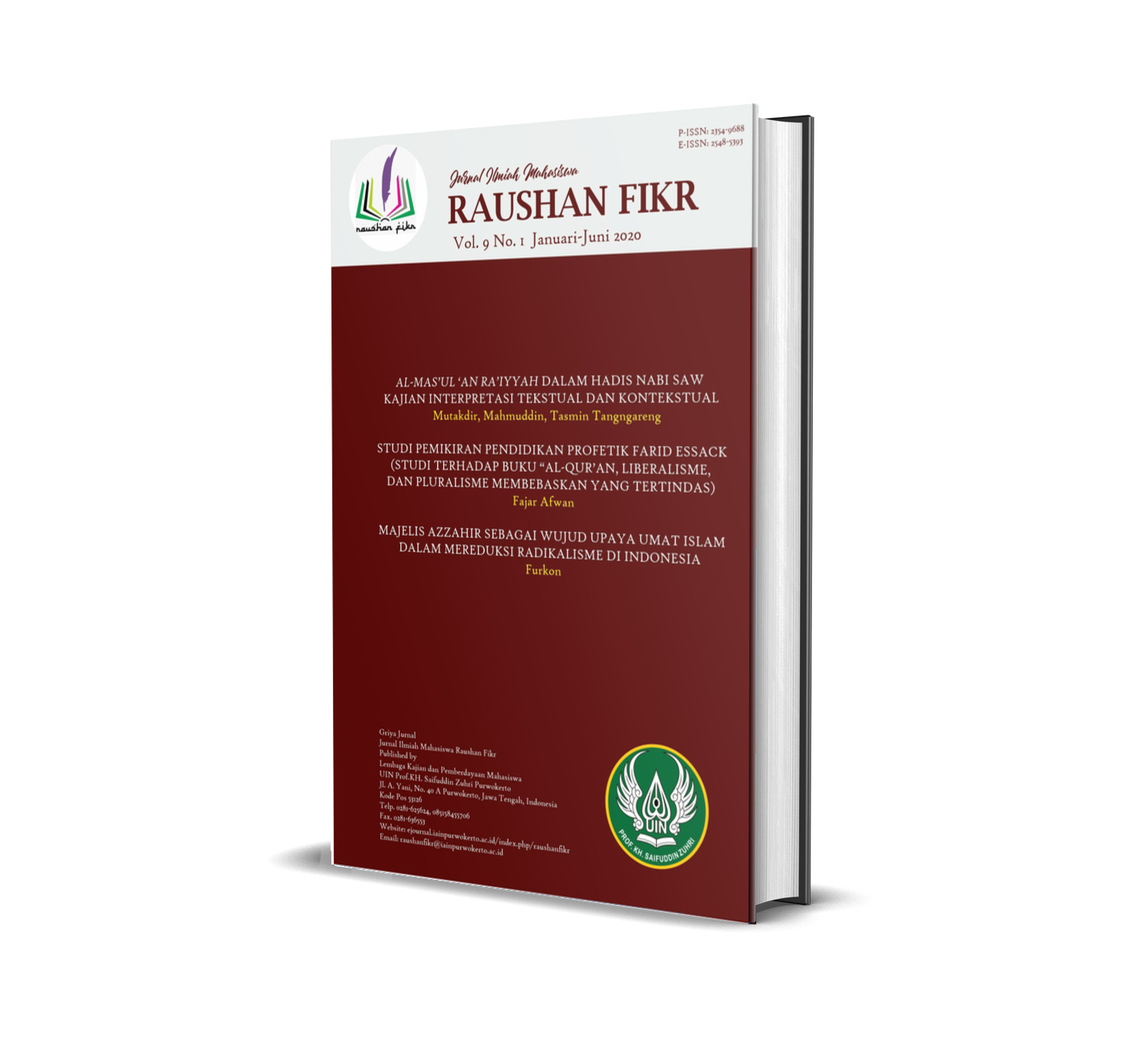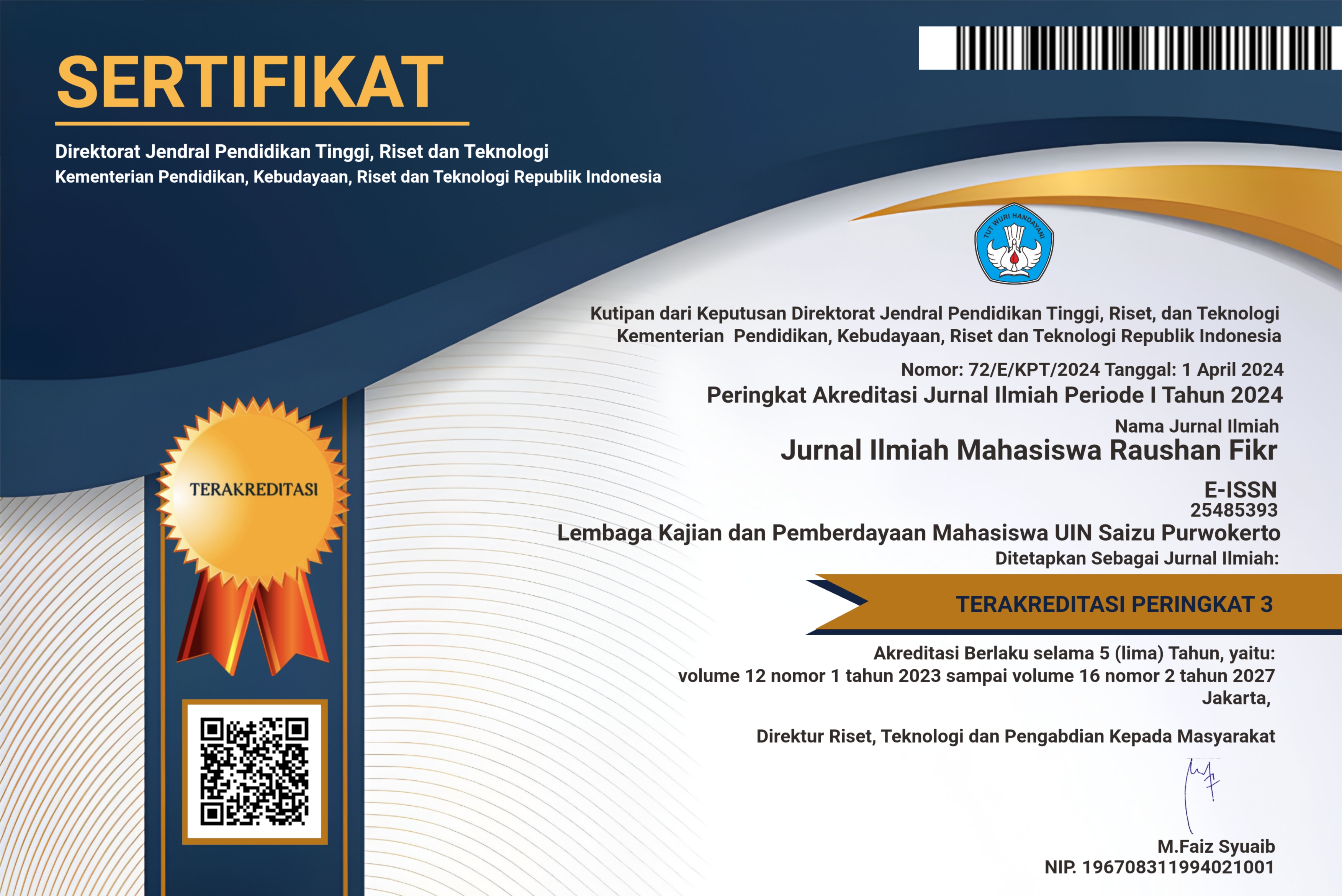MENAKAR KEADILAN PUTUSAN HAKIM TERHADAP KASUS BAIQ NURIL PERSPEKTIF MAQÄSID ASY-SYARI'AH
DOI:
https://doi.org/10.24090/jimrf.v9i1.4132Keywords:
Judge, Law, Justice, MaqÄá¹£id ash-Shari'ah.Abstract
This academic discourse is normative-juridical and casuistic with the integration of Islamic legal studies in the context of MaqÄá¹£id asy-Shari'ah which is aimed at the context of judicial administration by judges. This topic is examined because there is a practical ambiguity carried out by the Chief Justice in handling Baiq Nuril's legal case, namely justice which is the essence of the law in the judge's decision is not felt by Baiq Nuril. For this reason, the law produced in a judge's ruling should not only be in accordance with the laws and regulations. However, judges must also be able to examine substantively- inclusive outside normative law. In this case, the researcher uses literal- normative research methods with philosophical and normative-juridical approaches. The results of the study indicate that the judge's decision used to convict Baiq Nuril did not apply the value of legal justice which could lead to anomalies and a lack of public trust in the judiciary. Therefore, the implications of this study can lead to the context of the administration of justice by judges on the basis of legal justice.Downloads
References
Ash-Shiddieqy, Teungku Muhammad Hasbi. Falsafah Hukum Islam. Semarang: PT. Pustaka Rizki Putra, 2013.
Asshiddiqie, Jimly. Pengantar Ilmu Hukum Tata Negara. Jakarta: PT. Raja Grafindo Persada, 2015.
Atmadja, I Dewa Gede. Filsafat Hukum: Dimensi Tematis dan Historis. Malang: Setara Press, 2013.
Azhar, Hanif Fudin. “Pemikiran Imam al-Mawardi tentang Politik dan Hukum terhadap Kekuasaan Kehakiman di Indonesia.†Skripsi, Fakultas Syariah IAIN Purwokerto, 2019.
Bakir, Herman. Filsafat Hukum: Tema-tema Fundamental Keadilan dari Sisi Ajaran Fiat Justitia Ruat Caelum. Yogyakarta: Pustaka Pelajar, 2015.
CNN Indonesia. “Kronologi Perjalanan Kasus Baiq Nuril, Bermula dari Percakapan Telepon,†14 November 2018. http://m.cnnindonesia.com/nasional/20181114133306-12-346485/kronologi-perjalanan-kasus-baiq-nuril-bermula-dari-percakapan-telepon.
Djalil, H. A. Basiq. Peradilan Islam. Jakarta: Amzah, 2012.
Edi, Achmad. “Mendesain Kewenangan Kekuasaan Kehakiman Setelah Perubahan Undang-Undang Dasar 1945.†Jurnal Konstitusi 9, no. 4 (2012).
Fanani, Ahmad Zaenal. Berfilsafat dalam Putusan Hakim: Teori dan Praktik. Bandung: CV. Mandar Maju, 2014.
Ihsanuddin. “Jokowi Tekken Keppres Amnesti, Baiq Nuril Bebas,†20 September 2019.
https://nasional.kompas.com/read/2019/07/29/16565161/jokowi-tekken-keppres-amnesti-baiq-nuril-bebas.
Isharyanto. Hukum Kelembagaan Negara: Studi Hukum dan Konstitusi mengenai Perkembangan Ketatanegaraan Republik Indonesia. Yogyakarta: Deepublish, 2016.
Kadir, Adies. Menyelematkan Wakil Tahun: Memperkuat Peran dan Kedudukan Hakim. Tangerang: PT. Semesta Merdeka Book, 2018.
Kusumohamidjojo, Budiono. Teori Hukum: Dilema antara Hukum dan Kekuasaan. Bandung: Yrama Widya, 2016.
Machmudin, Dudu Duswara. “Mengembalikan Kewibawaan Mahkamah Agung sebagai Peradilan yang Agung.†Jurnal Konstitusi 10, no. 1 (2012).
Manan, Abdul. Etika Hakim dalam Penyelenggaraan Peradilan: Suatu Kajian dalam /sistem Peradilan Islam. Jakarta: Prenada Media Group, 2010.
Marzuki, Peter Mahmud Marzuki. Pengantar Ilmu Hukum. Jakarta: Prenada Media Group, 2014.
MD, Moh. Mahfud. “Politik Hukum dalam Perda Berbasis Syari’ah†XIV, no. 1 (2007).
Mertokusumo, Sudikno. Penemuan Hukum: Sebuah Pengantar. Yogyakarta: Cahaya Atma Pustaka, 2014.
Mertokusumo, Sudikno, dan A. Pitlo. Bab-Bab Tentang Penemuan Hukum. Yogyakarta: PT. Citra Aditya Bakti, 2013.
Mth, Asmuni. “Studi Pemikiran al-Maqashid: Upaya Menemukan Fondasi Ijtihad Akademik yang Dinamis.†Jurnal al-Mawarid 14 (2005).
Muhammad, Rusli. “Eksistensi Hakim dalam Pemikiran Yuridis dan Keadilan.†Jurnal Ius Quia Iustum 21, no. 3 (2014).
Nasution, Mohammad Syukri Albani. Hukum dalam Pendekatan Filsafat. Jakarta: Prenada Media Group, 2017.
Syailendra Persada. “Perjalanan Kasus Baiq Nuril: Dari Pengadilan Sampai Amnesti,†16 Juli 2019.
Rachmawati. “Perjalanan Panjang Baiq Nuril Mencari Keadilan.â€
https://regional.kompas.com/read./2019/07/09/07524561/perjalanan-panjang-baiq-nuril-mencari-keadilan (blog), 9 Juli 2019.
Rahardjo, Satjipto. Hukum Progresif: Sebuah Sintesa Hukum Indonesia. Yogyakarta: Genta Publishing, 2009.
Rahman, Zaini. Fiqih Nusantara dan Sistem Hukum Nasional: Perspektif Kemaslahatan Bangsa. Yogyakarta: Pustaka Pelajar, 2016.
Rawl, John. A Theory of Justice. London: Oxford University Press, 1973.
Rifai, Ahmad. Penemuan Hukum oleh Hakim Dalam Perspektif Hukum Progresif. Jakarta: PT. Sinar Grafika, 2011.
Samekto, Adji. Pergeseran Pemikiran Hukum dari Era Yunani menuju Postmodernisme. Jakarta: Konstitusi Press, 2015.
Santoso AZ, Lukman, dan Yahyanto. Pengantar Ilmu Hukum: Sejarah, Pengertian, Konsep Hukum, Aliran Hukum, dan Penafsiran Hukum. Malang: Setara Press, 2016.
Syamsudin, M. Konstruksi Baru budaya hukum Hakim Berbasis Hukum Progresif. Jakarta: Prenadamedia Group, 2015.
SyÄá¹ibÄ«, AbÄ« IsḥÄq asy-. al-MuwÄfaqÄt fÄ« Uṣūl asy-Syar’iyah. Vol. 1. Lebanon: DÄr al-Ma’arifat, t.t.
Toriquddin, Moh. “Teori MaqÄshid Syarī’ah Perspektif al-Syathibi.†Jurnal de Jure 6, no. 1 (2014).
Wasitaatmadja, Fokky Fuad. Filsafat Hukum: Akar Religiositas Hukum. Jakarta: Prenada Media Group, 2015.
Yasid, Abu. Logika Hukum: Dari Mazhab Rasionalisme Hukum Islam hingga Positivisme Hukum Barat. Yogyakarta: Saufa, 2016.
Downloads
Published
How to Cite
Issue
Section
License
Authors who publish with this journal agree to the following terms:
- Authors retain copyright and grant the journal right of first publication with the work simultaneously licensed under a Creative Commons Attribution-NonCommercial-ShareAlike 4.0 International License that allows others to share the work with an acknowledgement of the work's authorship and initial publication in this journal.
- Authors are able to enter into separate, additional contractual arrangements for the non-exclusive distribution of the journal's published version of the work (e.g., post it to an institutional repository or publish it in a book), with an acknowledgement of its initial publication in this journal.
- Authors are permitted and encouraged to post their work online (e.g., in institutional repositories or on their website) prior to and during the submission process, as it can lead to productive exchanges, as well as earlier and greater citation of published work (See The Effect of Open Access).
















